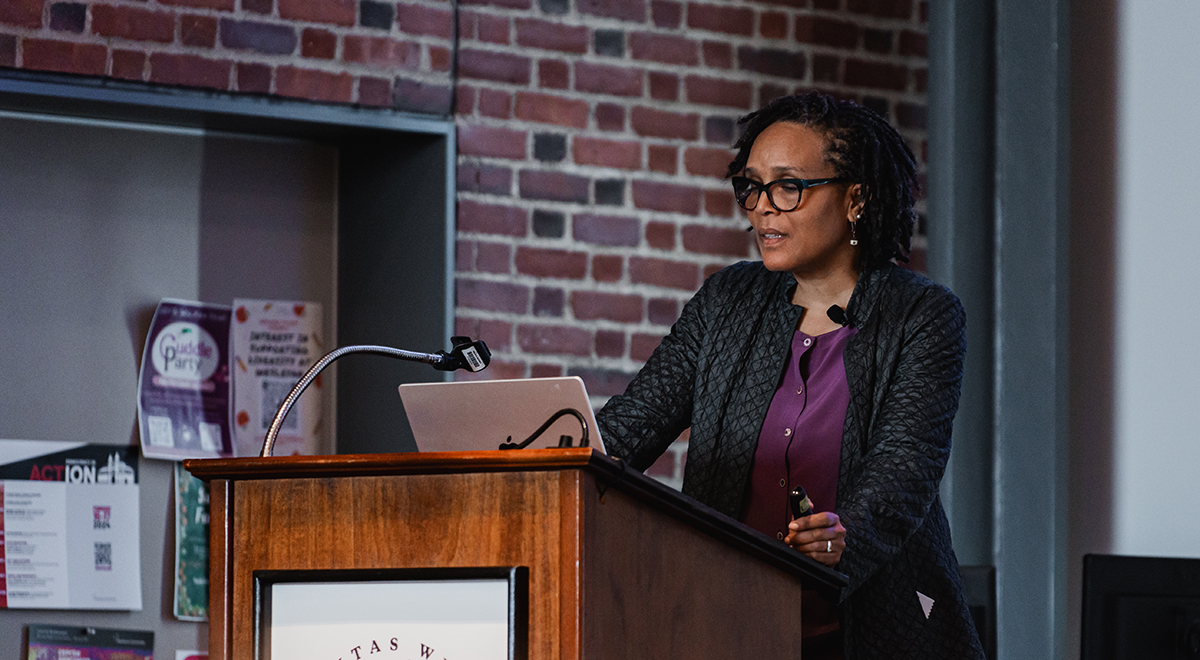Strain Praises Mentorship at Art and Activism Panel

On Saturday, Feb. 17, 2024, the Forum of the Frank Center for Public Affairs buzzed with discourse on higher education, civic engagement, and art as students, alumni, parents, and community members gathered for the second day of the Democracy in Action convening, sponsored by the Shasha Seminar for Human Concerns.
Corwin-Fuller Professor of Film Studies Tracy Heather Strain led a session titled “Art and Activism” where she discussed the impact of Black mentorship on her journey as a filmmaker, the importance of mentors for all artists, and activism through art. “Sometimes activism for Black artists is just practicing one’s art in particular spaces or providing opportunities [for others],” Strain said. “For other artists, it’s being tenacious in the face of funding difficulties to share stories of Black experiences and knowledge.” For her, telling Black stories and providing mentorship for the next generation of filmmakers is a vital form of activism.
Strain was inspired to pursue a career in filmmaking because there were stories—particularly those about the Black experience—that she wanted to tell. After watching the 1987 PBS documentary series Eyes on the Prize, which chronicled the history of the American civil rights movement, she recalled feeling “emotionally drained and inspired” each week after watching the episodes. “I never imagined history could be like that. I had never seen filmmaking so powerful.” She wanted to work for the company that produced the series.
Among her first filmmaking mentors was Henry Hampton, executive producer of Eyes on the Prize and founder of Blackside, Inc., a Black-owned film production company. “Henry was all about creating opportunity. He provided a place for emerging filmmakers like me to explore their ideas and passion,” Strain said.
The culture at Blackside was different from any film production environment that Strain had experienced before—or since. The staff and production teams were comprised of people of diverse racial backgrounds. “Out on location the crews were diverse as well. To me, it was activism.”
When Strain was brought back to Blackside years later to write, produce, and direct two episodes for the series I’ll Make Me a World: A Century of African American Arts, she was given an opportunity to explore another subject she loved: Black artists. She interviewed visual artists, writers, dancers, and playwrights. “I’ll Make Me a World allowed me to hear first-hand about the struggles of Black artists,” Strain said. In the episode “The Dream Keepers,” she profiled Raven Wilkinson, the first Black ballerina to tour with a major classical ballet company in 1955 at the height of segregation in the American South. Wilkinson’s courage inspired many generations of young Black girls, including Misty Copeland, to pursue ballet. “Seeing someone like you doing the work can make all the difference,” Strain said. “To me, that is activism as well.”
Many of Strain’s films center the experiences of Black, women artists, like playwright and activist Lorraine Hansberry, author of the acclaimed play, A Raisin in the Sun, and anthropologist Zora Neale Hurston, author of several books, including Their Eyes Were Watching God. Hurston also collected Black folklore in the South and the Caribbean because she believed Black culture was foundational to American culture. “This was her activism,” Strain said, “striving to represent Black people authentically.”
“I was determined to make a film about Hansberry’s journey as an artist-activist…Hansberry was a left-wing radical and secretly a lesbian, and her most famous play was intended to be social protest. I wanted to make a film that especially moved teenagers and young adults. I wanted them to feel like I did at the end of Eyes on the Prize: all full of feelings of freedom and inspiration and possibility to pursue their dreams.”
But it took Strain more than 14 years to raise the money to film her Lorraine Hansberry project. During that time, she often struggled to find work and considered quitting the film industry. In these moments, she recalled the attributes of her mentor: “One of the most important things that Henry Hampton did for me was model the need for tenacity,” Strain said. When Sighted Eyes/Feeling Heart premiered in 2017, the Hansberry documentary earned Strain numerous awards, including a Peabody and an NAACP Image Award for Outstanding Directing in a Motion Picture.
Now an award-winning filmmaker, endowed professor of film studies, and president and CEO of The Film Posse, the production company she co-founded with her partner and colleague Randall MacLowry ’86, Strain also shoulders the responsibilities of a mentor. “There is a crucial need for mentors who help create opportunities for students and artists,” said Strain. The Film Posse hired 11 Wesleyan student interns to conduct research for Strain’s 2023 documentary, Zora Neale Hurston: Claiming a Space.
Though she’s still passionate about the work, Strain didn’t sugarcoat it: making any kind of art is hard. It’s even more difficult in the wake of cancel culture, radical censorship, and banned books in schools, noting that today, some students can no longer read A Raisin in the Sun or Their Eyes Were Watching Good in school libraries.
“Milan Kundera wrote, ‘The first step in liquidating a people is to erase its memory, destroy its books, its culture, it’s history…’”
But Strain urged listeners who want to create art as a form of activism to keep their eyes on the prize: “We cannot let anyone silence us. It is once again extremely important that artists continue to make work that speaks to the truth and shares our history—everyone’s history.”

